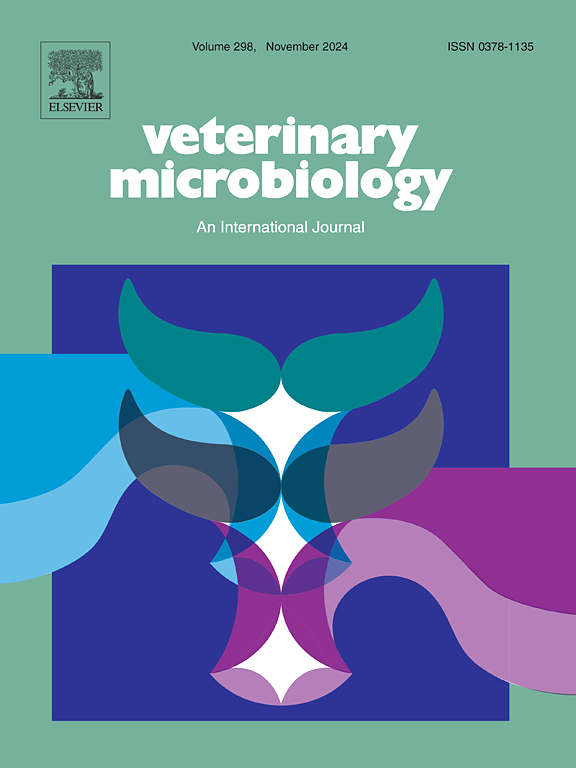Impact of foot-and-mouth disease virus on memory T and B cell populations in swine
IF 2.4
2区 农林科学
Q3 MICROBIOLOGY
引用次数: 0
Abstract
Foot-and-mouth disease virus (FMDV) is a highly contagious picornavirus that poses a serious threat to the global livestock industry. This study aimed to investigate the impact of FMDV infection on the memory immune response in pigs and to analyze the role of type II interferon (IFN-γ) in this process. By comparing pigs artificially infected with FMDV and those vaccinated with inactivated FMDV vaccine, we found that FMDV infection significantly suppressed the development of memory T helper (Th) and B cell populations, affecting the memory immune response. Further experiments showed that pretreatment with IFN-γ could counteract the immunosuppression caused by FMDV, and this counteraction was achieved by promoting the expression of three transcription factors: T-bet, Eomes, and Bcl-6. Our findings emphasize the key role of IFN-γ in regulating the host's immune response to FMDV infection and provide new scientific evidence for the development of effective FMDV vaccines.
求助全文
约1分钟内获得全文
求助全文
来源期刊

Veterinary microbiology
农林科学-兽医学
CiteScore
5.90
自引率
6.10%
发文量
221
审稿时长
52 days
期刊介绍:
Veterinary Microbiology is concerned with microbial (bacterial, fungal, viral) diseases of domesticated vertebrate animals (livestock, companion animals, fur-bearing animals, game, poultry, fish) that supply food, other useful products or companionship. In addition, Microbial diseases of wild animals living in captivity, or as members of the feral fauna will also be considered if the infections are of interest because of their interrelation with humans (zoonoses) and/or domestic animals. Studies of antimicrobial resistance are also included, provided that the results represent a substantial advance in knowledge. Authors are strongly encouraged to read - prior to submission - the Editorials (''Scope or cope'' and ''Scope or cope II'') published previously in the journal. The Editors reserve the right to suggest submission to another journal for those papers which they feel would be more appropriate for consideration by that journal.
Original research papers of high quality and novelty on aspects of control, host response, molecular biology, pathogenesis, prevention, and treatment of microbial diseases of animals are published. Papers dealing primarily with immunology, epidemiology, molecular biology and antiviral or microbial agents will only be considered if they demonstrate a clear impact on a disease. Papers focusing solely on diagnostic techniques (such as another PCR protocol or ELISA) will not be published - focus should be on a microorganism and not on a particular technique. Papers only reporting microbial sequences, transcriptomics data, or proteomics data will not be considered unless the results represent a substantial advance in knowledge.
Drug trial papers will be considered if they have general application or significance. Papers on the identification of microorganisms will also be considered, but detailed taxonomic studies do not fall within the scope of the journal. Case reports will not be published, unless they have general application or contain novel aspects. Papers of geographically limited interest, which repeat what had been established elsewhere will not be considered. The readership of the journal is global.
 求助内容:
求助内容: 应助结果提醒方式:
应助结果提醒方式:


